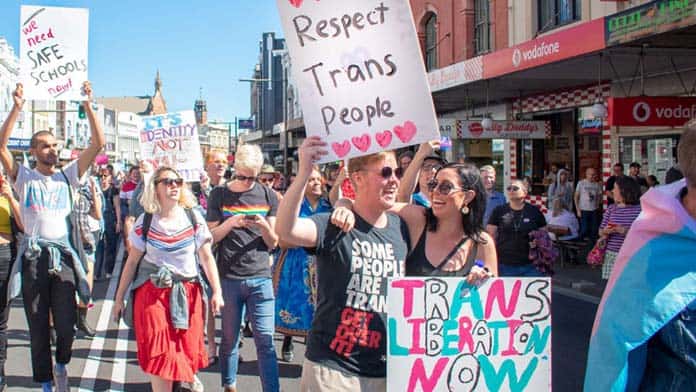The powerful who say they stand for ‘free speech’ are trying to snuff out resistance to oppression, writes David Glanz.
One of the key ways in which the ruling class maintains its control is to sow doubt and confusion among those fighting for a better world.
In 1996, newly elected Liberal prime minister John Howard launched a series of rolling “culture wars”, designed to put his enemies on the back foot. The battleground was the writing of history, with attempts to downplay the extent of frontier massacres as Indigenous people resisted colonisation, accompanied by an assault on multiculturalism and so-called “political correctness”.
Today the right’s intellectual warriors have a new target: “cancel culture”. Conservative historian Stephen Chavura defines it as “people being demonised and their careers ruined or threatened simply for stating views at odds with postmodern and critical theory dogmas on sexuality, gender and race relations”.
In reality, the right promotes the concept of cancel culture as a weapon to undermine the gains made by decades of struggle by the oppressed. Some reactionaries go further, arguing that cancel culture is a part of cultural Marxist conspiracy originating with Jewish Marxist intellectuals, a conclusion that can only encourage antisemitism.
The right will not tolerate any challenge to its power. As lawyer Nyadol Nyuon writes: “Political correctness, snowflakes and ‘woke cancel culture’ are the new justifications to reinstate the dominant viewpoint.”
Resentment
Chavura, who has written a new book, Cancel Culture and the Left’s Long March, argues that “the only remedy to cancel culture is courage culture”.
Who are these poor put-upon creatures who need to show courage? Their ranks include an array of the rich and powerful, including the Conservative Political Action Conference (CPAC) in the US, which in February rallied affluent Trump supporters and fellow reactionaries under the title “American Uncanceled”.
Rupert Murdoch’s The Australian newspaper thunders against cancel culture relentlessly while the conservative magazine, Spectator Australia, lauds politicians Matt Canavan (defender of coal), Craig Kelly (defender of crank COVID cures) and Amanda Stoker (defender of “men’s rights” activist Bettina Arndt) for their opposition.
What they all have in common is resentment that decades of campaigning by women, people of colour and LGBTI+ people and their supporters have made it more difficult to engage in oppressive actions or language.
As has-been comedian Daryl Somers moaned in February: “You probably could not get away with half the stuff you could on Hey Hey now because of the political correctness and the cancel culture.” Some of that “stuff” included hitting Malaysian-born singer Kamahl in the face with white powder and telling him “you’re a real white man” afterwards.
They cloak their reactionary views in concern for “alternative views” and “free speech”. It is a position riddled with hypocrisy.
Before the CPAC’s “American Uncanceled” conference had even begun, organisers cancelled a speaker, Young Pharaoh, for his antisemitic views.
Meanwhile Trump is calling on his supporters to boycott (“cancel”) dozens of corporations which have taken a stand against a law change in the state of Georgia that would make it much harder for people to vote, especially African-Americans.
Many of the same Liberal MPs who whinge about cancel culture want to prevent the industry super funds from supporting The New Daily, one of the few online news sites not controlled by Murdoch or Nine.
The government is silent on the plight of Julian Assange, whose “crime” was to publish leaked information on the horrors of the US-Australian war in Iraq.
And the Australian free speech warriors had nothing to say when the Fair Work Commission banned the words “scab” and “rat” at the CUB strike picket line in Melbourne in 2016 and again at the Longford oil workers’ picket in 2017.
Balance of power
Some progressives have also been taken in. Last year 150 public figures, including Margaret Atwood, Noam Chomsky and Gloria Steinem, signed an open letter to Harper’s Magazine after Harry Potter author J.K. Rowling was criticised for denigrating transgender women.
The Harper’s signatories wrote: “The restriction of debate, whether by a repressive government or an intolerant society, invariably hurts those who lack power and makes everyone less capable of democratic participation.”
This statement gets the power relationship completely the wrong way around. It is those who rail against cancel culture who have power, not those fighting back against oppression.
It is the Liberal government that is refusing to properly fund women’s refuges or rape crisis centres, that denied JobSeeker to international students and refugees, and that fought until the last against marriage equality.
Historian Judith Brett has highlighted how the Liberals’ obsession with crushing the left on campus is wrecking university humanities courses.
“It is not identity politics but the shrinking of humanities and social science faculties and curriculum across the country that is the biggest threat to our young people’s education,” she wrote.
The Liberals who decry cancel culture have no problems bullying those with less power.
Under pressure from right-wing commentators such as Andrew Bolt, the ABC decided not to broadcast comedian Tom Ballard’s anti-Liberal set at the Melbourne International Comedy Festival.
When the student editors of the University of Sydney paper Honi Soit decided in April to unpublish a story concerning academics’ links to the Chinese government “out of concern for the safety of academics mentioned in the article” they were set upon by a series of federal Liberal MPs.
Education Minister Alan Tudge used the might of his position to lay into the students, saying: “Left activists have forgotten what freedom of speech means in an era of woke culture.”
Liberal minister Amanda Stoker used her access to the media to pillory Australian of the Year, Grace Tame, who had criticised her for supporting a “fake rape crisis” tour on university campuses.
Rather than address concerns about sexual assault on campuses, Stoker turned on her critic, saying: “I don’t think the answer is shutting down and refusing the right to speak for people who share a different point of view to you.”
Tame and even the Honi Soit editors have some resources to put up a defence against this bullying. But countless others do not.
People of African background suffered abuse as the Liberals in Victoria campaigned against so-called “African gangs” and Peter Dutton declared that Melburnians were too scared (pre-COVID) to go out to dinner.
The Liberals’ rhetoric led to racist attacks surging across Melbourne by 50 per cent. As the Federation of Community Legal Centres reported: “Two Caucasian men seized a young African-Australian mother’s pram and rattled it, with her baby inside, yelling racist abuse … an African-Australian teenager was stabbed by a Caucasian man who told him to ‘go back to where you come from’.”
LGBTI+ people are also victims of the right-wing bullies. Nick Duffy wrote in PinkNews: “Many of Rupert Murdoch’s most prominent outlets have developed an intense and hostile fixation on LGBT+ issues over the past few years as they appear to increase their focus on so-called ‘culture war’ issues.”
Equality Australia lashed the newspaper’s “disgraceful obsession with humiliating trans people”.
This kind of campaigning feeds a situation where in the midst of lockdown in June 2020, 49 per cent of trans Australians reported thoughts of self-harm or suicide, more than three times the national rate.
Platform politics
Those who attack cancel culture say that its crime is to deny conservatives a platform for their views. This is total nonsense. The right has the backing – and the platform – provided by massively powerful institutions such as Murdoch’s News Corp, the Liberal and National parties, and well-funded think tanks.
When the left protests against those who promote bigotry, we are challenging views that lead to real misery for many people. They have their free speech, but so do we.
Socialists are opposed to all forms of oppression and fight for a world free of racism, sexism, transphobia and homophobia. We build and join protests such as the recent campaign at the University of Melbourne against a transphobic web site.
In mobilising against oppression, we should acknowledge, however, that it is possible to win some people over through debate.
There was a time, for example, when most unions accepted or even promoted positions such as restrictions on the right of married women to work. But decades of campaigning by socialists and feminists turned things around and the union movement is now very much part of fighting for women’s rights.
Socialists are, however, for “no platforming” Nazis. There is no possibility of debate with people who want to obliterate all forms of working class organisation and kill Jews, Muslims, LGBTI+ people and more.
We are for mass, militant mobilisations that shut down Nazi rallies or forums – and such mobilisations will likely include those who have a wrong position on trans rights or Palestine.
We can unite against an existential threat while not giving a centimetre on our principled positions on fighting oppression.
Hypocrites
When conservatives criticise cancel culture, they are in reality defending their “right” to promote reactionary ideas that they use to head off criticism of their real crimes – poverty, inequality, defence of fossil fuels and more.
In reality it is they who use their power in the mass media, in government and in universities to deny critics of oppression and the system democratic rights and a platform. They are hypocrites.
The narrative of cancel culture is a false one that must be resisted if we are to fight a class war for democracy and socialism.





